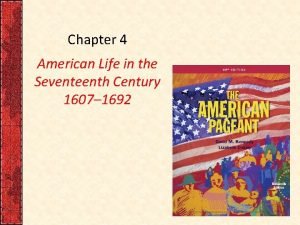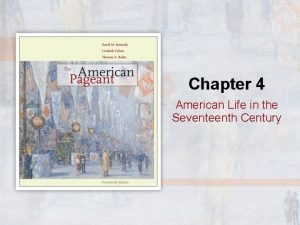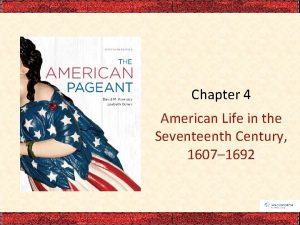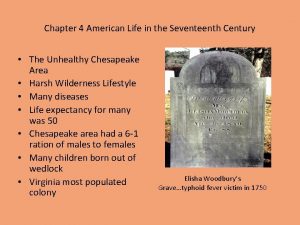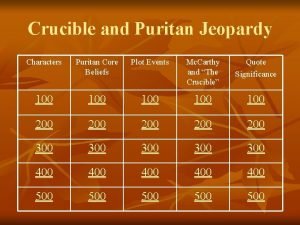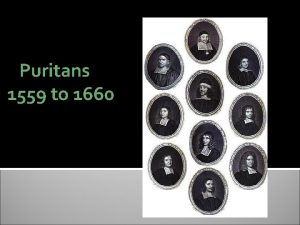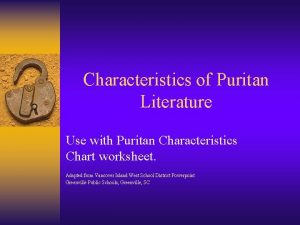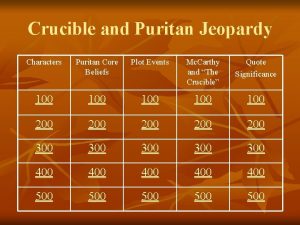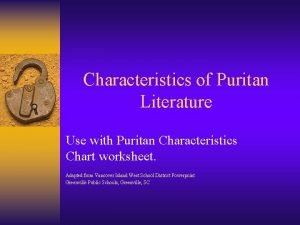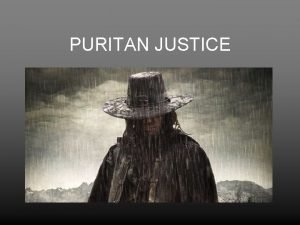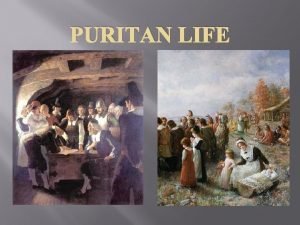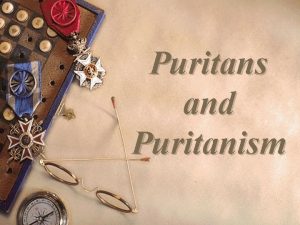A Puritan timeline The Seventeenth Century 1603 Arminius










- Slides: 10

A Puritan timeline The Seventeenth Century

§ 1603 Arminius : predestination is based on fore-knowledge § 1603 James I becomes King § 1604 The Puritans meet James at Hampton Court. Their hopes are dashed § 1609 d. Jacobus Arminius § 1610 b. Brother Lawrence § 1610 The Arminians issue the Remonstrance containing 5 articles § 1611 The King James Version, the most influential ET of the Bible § 1615 b. Puritan Richard Baxter, author of The Reformed Pastor § 1616 b. Puritan John Owen, called the Calvin of England

The Reformed Pastor § By Richard Baxter (1615 -1691) was vicar of Kidderminster from 1647 to 1661. In an introduction to this reprint, Dr. J. I. Packer describes him as "the most outstanding pastor that Puritanism produced. " His ministry transformed the people of Kidderminster from "an ignorant rude and revelling people" to "a godly worshipping community. "

The Death of Death in the Death of Christ § By John Owen The Death of Death in the Death of Christ is a polemical work designed to show, among other things, that the doctrine of universal redemption is unscriptural and destructive of the gospel. Nobody has a right to dismiss the doctrine of the limitedness of the atonement as a monstrosity of Calvinistic logic until he has refuted Owen's proof that it is part of the uniform biblical presentation of redemption, clearly taught in plain text after plain text.

§ 1618 The Book of Sports is published. It contradicts the Puritan view of the Sabbath, but Puritans are forced to read it § 1618 -1619 The Synod of Dort is called in the Netherlands to answer the Arminians. The response forms 5 point Calvinism § 1620 Plymouth, Massachusetts colony founded by Puritans § 1623 b. Blaise Pascal § 1623 b. Francis Turretin § 1625 Charles I becomes King. He too is against the Puritans § 1628 William Laud becomes Bishop of London and steps up oppression of the Puritans § 1628 b. Puritan John Bunyan, author of Pilgrim's Progress among many other works of poetry and prose

Pilgrim's Progress: One Man's Search for Eternal Life -A Christian Allegory By John Bunyan For centuries, millions have cherished this evangelical masterpiece. Written in prison, it's an insightful allegory of the conflict between religion and society, featuring Bunyan's own spiritual struggle as he found salvation in Christ and began preaching. Journey with Christian as he travels toward the Celestial City!

§ § § § 1629 Charles I dismisses Parliament 1630 John Winthrop and many Puritans migrate to America 1632 b. Locke, founder of empiricism 1633 The Book of Sports is renewed 1636 Harvard founded by Puritans 1638 The National Covenant 1640 Charles I summons Parliament. They curtail his power § 1643 The Solemn League and Covenant § 1643 -1646 The Westminster Assembly

§ 1646 Cromwell's army defeats King at the Battle of Naseby § 1647 George Fox founds Society of Friends (Quakers) § 1649 Charles I executed. Oliver Cromwell is Lord Protector § c. 1650's Brother Lawrence became a monk, and "walk(ed) with God around a kitchen forty years" § 1654 Conversion of Pascal. He started collecting notes for an Apology for the Christian Religion. It was unfinished, but his notes were published posthumously as Pensees § 1658 d. Cromwell

§ 1660 Charles II becomes King of England § 1661 -1663 John Eliot publishes the Bible in Algonkian, a Native American language. Over the course of his life he also helped plant at least 14 Native American churches § 1662 d. Pascal § 1662 New Act of Uniformity, over two thousand Puritan pastors resign or are forced out

§ 1675 Philip Jacob Spener's Pia Desideria helps begin the pietist movement § Edict of Nantes is revoked, making Protestantism illegal again in France. Many huguenots emigrated, some stayed and met in secret § 1685 b. J. S. Bach, called the fifth evangelist § 1687 d. Turretin Institutes of Elenctic Theology § 1688 William and Mary take throne. Puritans are free to preach and establish their own churches § 1691 d. Brother Lawrence
 Chapter 4 american life in the seventeenth century
Chapter 4 american life in the seventeenth century Chapter 4 american life in the seventeenth century
Chapter 4 american life in the seventeenth century Chapter 4 american life in the seventeenth century
Chapter 4 american life in the seventeenth century Chapter 4 american life in the seventeenth century
Chapter 4 american life in the seventeenth century Puritan age timeline
Puritan age timeline Puritan timeline activity
Puritan timeline activity Summer of the seventeenth doll summary
Summer of the seventeenth doll summary Principles of marketing chapter 2
Principles of marketing chapter 2 1603 anglie
1603 anglie Error 1603 kaspersky
Error 1603 kaspersky 1558 1603
1558 1603
